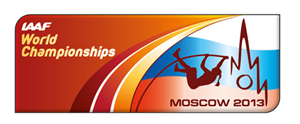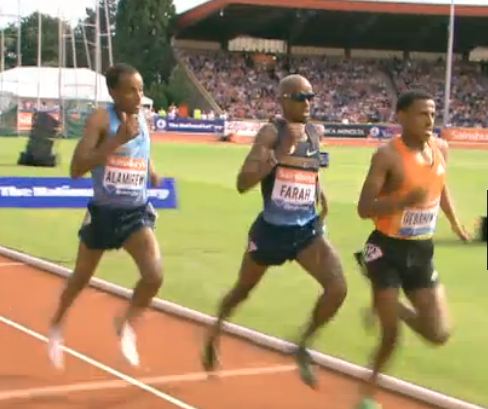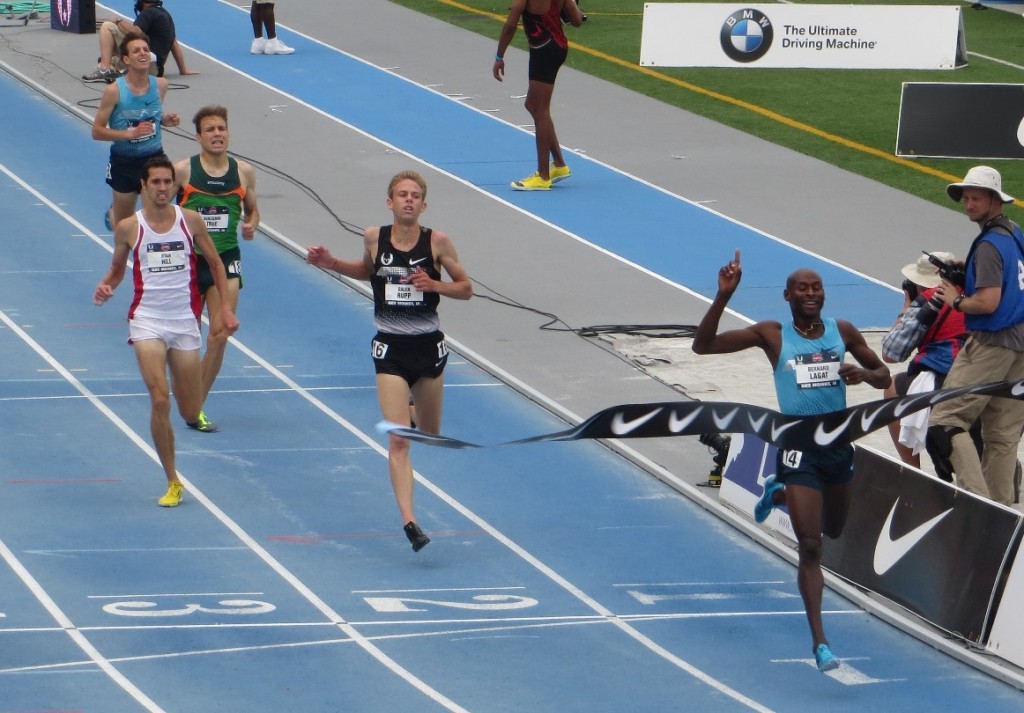Yenew Alamirew And Edwin Soi Try To Take Down Mo Farah – Do Rupp And Lagat Have A Shot? – Men’s 5,000 Preview
by LetsRun.com
August 6, 2013
Previewing the men’s 5,000 before the 10,000 is run can at times be like a bit like previewing a baseball game when you don’t know who the starting pitchers are going to be.
However, barring a really crazy result in the 10,000, there will only be one likely medallist coming back from the 10,000, so this preview of the men’s 5,000 at the 2013 IAAF World Outdoor Track and Field Championships should be pretty accurate.
We’ve broken down the field into four categories – the “three gold medal contenders,” “two guys we can intellectually fathom winning but don’t think will,” “other potential medallists,” and “what about the other two Americans Galen Rupp and Ryan Hill?”
The Three Gold Medal Contenders
1) Mo Farah – Great Britain – The reigning 10,000 and 5,000 Olympic champion is obviously the man to beat here as the 5,000 is his best event – as shown by the fact that he also won the 5,000 at Worlds in 2011 (but was beaten in the 10,000).
With his recent 3:28 clocking in the 1,500, many would assume he’s unbeatable here. We, however, know there is a reason why they run they race and don’t hand out the medals based on past accomplishments.
All humans are beatable on a given day. Remember, Farah was beaten in the 5,000 in June when he was coming off an illness. While that may have been a good reminder to some that it’s possible for Farah to still lose, if anything, that race makes Farah seem more unbeatable to us as he’d been so sick going into that race that American Dathan Ritzenhein thought he had a shot at Farah. Yet Farah beat everyone but Edwin Soi.
Barring illness, how could Farah possibly lose? We’ll try to come up with some possible chinks in his armor.
i) Despite his amazing speed, others have closed as fast or nearly as fast as Farah both last year and this year.
At last year’s Olympics, Ethiopia’s Dejen Gebremeskel closed just as fast as Farah over the last lap but finished a well-beaten second as he started behind and encountered significant traffic on the last lap.
In the tremendous Birmingham 5,000 this year, when Farah earned his biggest victory of the year in the best 5,000 of the season, Farah had to dig deep to outkick Ethiopia’s Yenew Alamirew. As we explained back on July 1, Farah won by .47 but only outkicked him by about a quarter of a second because Alamirew was coming from behind and running more distance. So if Farah is .2-.3 better over the last lap, he conceivably could lose if the roles are reversed and Alamirew has the lead and Farah has to run extra ground.
ii) Perhaps Farah has sacrificed some strength for speed and he’s vulnerable in an honest race.
A 10,000-meter man has never run 3:28 for 1,500 before this year. Has Farah developed that speed at the expense of strength? We’re just asking the question. He looks plenty fit to us, but the truth is Farah hasn’t run a fast 5,000 this year (just 13:05) so we don’t know for sure. This question will likely be answered in the 10,000 final. If Farah loses there, he suddenly looks a lot more vulnerable here in the 5,000.
2) Yenew Alamirew – Ethiopia – With victories in Rome over Kenya’s three entrants this year (12:54.95 winning time) and in Lausanne over Ethiopian rival Hagos Gebrhiwet (which featured a 24.1 last 200 by Alamirew), and an impressive runner-up showing to Farah in Birmingham, Alamirew has emerged as Ethiopia’s best bet for gold in the 5,000 in Moscow.
The race in Birmingham was riveting and Alamirew really made Farah work for it. However, that was on June 30th and the 5,000 final is nearly seven weeks later on August 16th. Last year, Alamirew was in great shape prior to the Olympics (he ran 12:48 in Paris in his last race) but was a disappointing 12th in the final. He’ll have to get his peak right this year if he’s going to contend.
Alamirew has great wheels and has a shot. We just think he needs to be in the lead and saving ground instead of trying to get Farah from behind.
3) Edwin Soi – Kenya – Unlike the Ethiopians, where it’s clear in our minds who has the best shot of pulling the upset of Farah off, it’s not easy to determine who the #1 Kenyan is. A case can be made for all three but 27-year-old Edwin Soi is probably most people’s choice.
Soi, after all, is the one man on the planet who has beaten Mo Farah while Farah has been coached by Alberto Salazar. Prior to Farah’s 5,000 loss to Soi in Eugene on June 1, Farah’s last loss in a 5,000 was when he was 5th in Zürich at the end of the 2010 season on August 19th. Since then Farah has run 13 5,000s and won 12 of them. But as stated above, Farah was coming off of an illness.
Since then, Soi was just fifth in Rome and third at the Kenyan Trials. But just when we were about to write him off as being someone who had peaked to soon, Soi put up a world-leading 12:51.34 win in Monaco in his last race before Worlds.
Surprisingly, this is Soi’s first outdoor Worlds. He’s been to two Olympics, winning bronze in 2008 before disappointing last year and not even making the final. Going from a non-factor at one championship to a winner at the next would be unprecedented right? Nope. Mo Farah went from seventh in 2009 to 1st in 2011.
Two Guys We Can Intellectually Fathom Winning But Don’t Think Will
1) Hagos Gebrhiwet – Ethiopia – After a 12:47.53 last year at age 18 and early season DOMINANT victories in Doha and New York this year, Gebrhiwet seemed to possibly be on his way to becoming Mo Farah’s main rival in the 5,000 and the future king of the 5,000/10,000 for Ethiopia.
However, results haven’t gone so well since then for Gebrhiwet. Gebrhiwet has lost to his compatriot Alamirew three straight times in Rome, Birmingham (where Farah also beat him) and Lausanne.
The youngster is learning that being dominant in May isn’t the same thing as being dominant in August. Getting your peak right isn’t easy for anyone and often young runners burn it too hot early in the season and can’t sustain it the whole year. One, because they are inexperienced, and two, because by being in shape early in the year, they can earn life-changing money for themselves and their family.
2) Isiah Koech – Kenya – The 19-year-old dominated the Kenyan Trials as he won in 13:35.12. 2012 Olympic bronze medallist Thomas Longosiwa was second in 13:36.82 with Mo Farah beater Edwin Soi third in 13:39.49. Because of that domination and because he’s allegedly a teen prodigy, we have to think it’s conceivable Koech wins gold.
If this race was being run at altitude in Nairobi, Koech would probably be our pick to win as he’s won 3-straight Kenyan 5,000s, but that’s not where Worlds are run. His European results this year (and historically) haven’t been as encouraging, as he was only 10th at Pre and third in Rome before the Kenyan Trials and third in Monaco after them. The youngster has only one major 5,000 win on his resume (Zürich last year after the Olympics), so a win in Moscow would surprise us. However, he was 4th in 2011 and 5th last year, so he’s got a good shot at a medal.
Other Potential Medallists
1) Thomas Longosiwa – Kenya – The 31-year-old got the bronze last year and ran 12:49. This year, he’s results aren’t nearly as impressive. He’s run 12:59 and was fourth at Pre and in Monaco and 11th in Rome. But last year he was only fifth at Pre and fifth in Monaco and yet ended up third so who knows?
2) Albert Rop – Bahrain – The 18-year-old who was born in Kenya has improved dramatically in the last two months.
June 1st – 13:21.18 15th place at Pre.
June 6th – 13:10.14 8th place in Rome.
July 13th – 12:59.43 1st in Heusden.
July 19th – 12:51.96 2nd place in Monaco.
A medal for the guy who allegedly ran 13:03 at age 16 certainly wouldn’t stun us but a win would.
3) Bernard Lagat – USA – The 38-year-old looked good in winning USAs. However, since then, he dropped out of Monaco with a hip issue which Lagat says won’t prevent him from running in Moscow. But is Father Time finally catching up to him?
Lagat won silver two years ago but two years can change a lot at age 36 to 38. At the Olympics last year, he dropped down to fourth. Now he’s a year older than that, so we don’t think a medal is likely.
But a bronze wouldn’t stun us. Lagat has recently tweeted that he’s excited for Worlds and we’ve got proof that he’s not injured so that’s exciting for US fans:
Today at tempo run! And no, I don’t do calf raises.. lol! pic.twitter.com/RKmx2z7vAG
– Bernard Lagat (@Lagat1500) August 3, 2013
What About The Other Two Americans Galen Rupp And Ryan Hill?
There are two other Americans running the 5,000 in Moscow.
10,000 Olympic silver medallist Galen Rupp certainly is the greatest-ever American-born distance runner on the track in history in terms of absolute performances. But the 5,000 isn’t his best event. In his last four Diamond League/Olympic 5,000s, here are Rupp’s finishes.
6th at 2013 Monaco, 6th at 2013 Pre, 9th at 2012 Zürich, 7th at 2012 Olympics.
Yes, he was third at 2012 Prefontaine 5,000 and he’s a 3:50 miler, so a medal is within the realm of possibilities but not likely happen barring some amazing showing by Rupp in the 10,000. Up until this point so far during the outdoor season, Rupp has been just a tad bit off of his game as compared to last year.
Former NC State runner Ryan Hill goes to Moscow after a great summer, doing his best to imitate Chris Derrick in the “stud who never won an NCAA title” category. After not even scoring at NCAAs in the 1,500 this year, Hill snagged third at USAs in the 5,000. That was by no means a fluke. Hill had been injured after indoors and was just getting started as since then, he’s dropped his 5,000 PR from 13:26.34 to 13:14.22.
The 3:54 miler has good speed so if he both heats go tactical, it’s conceivable he could sneak into the final.
Quick Take #1: We decided to let you see in one place some of the last laps run in the big 5,000s that have been run so far this year. Alamirew, Farah and Soi all have great kicks.
Race – Winning Time – Winner – Last Lap
Eugene – 13:04.75 – Soi – 53.5
Rome – 12:54.95 – Alamirew – 54.02
Birmingham – 13:14.24 – Farah – 53.40
Monaco – 12:51.34 – Soi – 56.62
It’s worth noting that in 2011 and 2012 when Farah won gold at Worlds and the Olympics, he closed in 52.75 and 52.94 respectively (although the winning times were just 13:23 and 13:41).
Quick Take #2: We’ll likely update our thoughts after the 10,000 is held, but this race certainly is going to be fun to watch.
More: *2013 Prefontaine Classic Men’s 5,000: Mo Farah Is Beaten By Edwin Soi As Galen Rupp Finishes Sixth
*2013 Rome Golden Gala 5,000: Yenew Alamirew Stuns Hagos Gebrhiwet
*Mo Farah Wins A Tremendous 5,000m Over Gebrhiwet And Alamirew In Birmingham
*Yenew Alamirew Will Outkick You If Your Name Isn’t Mo Farah: Lausanne 2013 5,000m Recap
*MB: Wow: Alamirew 24.1 last 200 to win 2013 Lausanne!
*MB: How to beat Mo Farah? Be named Edwin Soi.
LRC Vault: 2012: Mo Farah Completes The Double & Wins Tactical 5,000 To Send British Crowd Into A Frenzy










